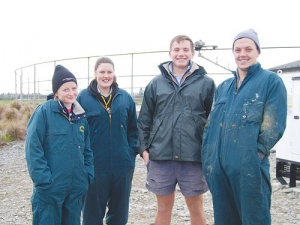Taratahi problems seen in 2018
The problems at Taratahi were laid open, prior to its interim liquidation in December, in August last year.
 Arthur Graves says young people coming into farming will need a good education, but traditional farm workers will always find roles.
Arthur Graves says young people coming into farming will need a good education, but traditional farm workers will always find roles.
Farmers in future will have to do both traditional farm work and have more high-end skills, says Taratahi Agriculture Training Centre chief executive Arthur Graves.
He says the future will bring more corporate-type farming operations, where employers will have to be much more skilled in human resources -- recruiting, retaining and getting full value from their staff.
And many young people coming into farming will need a good education, Graves says, though traditional farm workers will always find roles.
“That means Taratahi will have to service the current market, focusing on turning out good skilled workers, and develop our ability to keep up and get ahead of changes,” he told Rural News.
“It’s a two speed thing: we need to be thinking about young people, and about future employers, with high-end skills, management and leadership skills, systems thinking and problem solving skills and the ability to use data and sophisticated planning techniques.”
Graves sees the smartphone as not just a replacement for pen and paper, but also a means of enabling farmers to do more.
A challenge facing the wider agri-sector is where the next generation of farm workers will come from, he says. NZ is among the highly urbanised countries in the OECD and a way must be found to connect the values of farming with young people.
Historically farmers have been in agriculture for the lifestyle and their love of the work, “so how do you translate that into a modern paradigm for young people?” he asks.
“What is it that appeals to them? For example, could it be they value animals, looking after the environment or just value outdoor work? What pushes their buttons?”
Today’s young people don’t have the same access to agriculture as he and others of earlier generations had.
Though he wasn’t brought up on a farm, he lived in a small rural town and spent time with friends whose parents had farms.
NZPork has appointed Auckland-based Paul Bucknell as its new chair.
The Government claims to have delivered on its election promise to protect productive farmland from emissions trading scheme (ETS) but red meat farmers aren’t happy.
Foot and Mouth Disease outbreaks could have a detrimental impact on any country's rural sector, as seen in the United Kingdom's 2000 outbreak that saw the compulsory slaughter of over six million animals.
The Ministry for the Environment is joining as a national award sponsor in the Ballance Farm Environment Awards (BFEA from next year).
Kiwis are wasting less of their food than they were two years ago, and this has been enough to push New Zealand’s total household food waste bill lower, the 2025 Rabobank KiwiHarvest Food Waste survey has found.
OPINION: Sir Lockwood Smith has clearly and succinctly defined what academic freedom is all about, the boundaries around it and the responsibility that goes with this privilege.

OPINION: For years, the ironically named Dr Mike Joy has used his position at Victoria University to wage an activist-style…
OPINION: A mate of yours truly has had an absolute gutsful of the activist group SAFE.